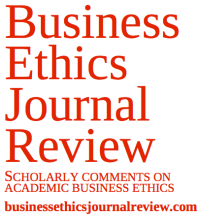v13n1: Larue and Endörfer on MFA’s Demandingness
Posted: January 27, 2026 Filed under: Uncategorized Leave a comment

“Can the MFA Be Rescued From the Overdemandingness Objection?” by Louis Larue and Richard Endörfer
AN INVITED RESPONSE TO AN INVITED RESPONSE TO Espen Dyrnes Stabell (2024), “An Excusability Principle For Firms Under the Market Failures Approach,” Bus Ethics J Rev 11(4): 22–27, https://doi.org/10.12747/j1k04
In Endörfer and Larue (2024), we argue that Heath’s Market Failures Approach makes excessive epistemic demands on market participants in imperfectly competitive markets. Stabell attempts to salvage the MFA by supplementing it with an excusability principle. He claims that managers may be excused when they cannot uphold their duty, either because of epistemic uncertainty or because of problems posed by the Theorem of Second Best. Here, we respond that Stabell’s excusability principle cannot save the MFA from the overdemandingness objection: when the MFA is overdemanding, agents cannot have an obligation to act upon its recommendations. However, if there is no obligation, there is no need for an excuse.
To download the full PDF, click here: Larue and Endörfer on MFA’s Demandingness
Louis Larue is a Marie Curie Postdoc at Aalborg University (Denmark) and an invited lecturer in Philosophy at UCLouvain (Belgium). Richard Endörfer is a visiting Postdoc at the Ethics Institute at Utrecht University (Netherlands).
v12n3: Peterson on Finestone and Kingston on Price Gouging
Posted: October 9, 2025 Filed under: Uncategorized Leave a comment
“For Crisis Prices and Against Anti-Price Gouging Statutes,” by Eric Peterson
A COMMENTARY ON Finestone, K. and E. Kingston (2022), “Crisis Prices: The Ethics of Market Controls During a Global Pandemic,” Bus Ethics Q 32(1): 1240 https://doi.org/10.1017/beq.2021.15
Finestone and Kingston (2022) argue that global persistent crises reveal both a new justification for price gouging as well as the need for the creation and regulation of a new category of goods—reserved goods. While I accept the new justification for price gouging, I raise concerns over the creation and regulation of a new category of goods. In particular, I argue that there are conceptual problems with the current distinction of goods – luxury versus essential – so often used in the price gouging literature. Further, I argue that these problems plague the new category of goods as well.
To download the full PDF, click here: Peterson on Finestone and Kingston
Eric Peterson is an Assistant Professor of practice in business ethics at the Dolan School of Business of Fairfield University. He is also an affiliate faculty member at the Waide Center for Applied Ethics at Fairfield University. He is interested in too many things. These include business ethics, imagination, and philosophy of religion.
v12n2: Pouryousefi and Tallant on Kim and Routledge on Trust
Posted: September 16, 2025 Filed under: Uncategorized Leave a comment
“Trust, the Participant Stance, and Firms,” by Sareh Pouryousefi and Jonathan Tallant
A COMMENTARY ON T. W. Kim and B. R. Routledge (2022), “Why a Right to an Explanation of Algorithmic Decision-Making Should Exist: A Trust-Based Approach,” Bus Ethics Q 32(1): 75–102 https://doi.org/10.1017/beq.2021.3
Kim and Routledge (2022) offer a normative account of trust in firms, drawing on a philosophical approach to trust, “the participant stance.” This Commentary raises a challenge to Kim and Routledge. For a participant stance view of trust to be applicable to firms, we argue that firms must be seen as fitting targets and sources of reactive attitudes in morally relevant trust relationships. It is far from clear that firms are a fitting target within Kim and Routledge’s account..
To download the full PDF, click here: Pouryousefi and Tallant on Kim and Routledge on Trust
Sareh Pouryousefi is an Assistant Professor at Toronto Metropolitan University, Canada. Her research focuses on the normative foundations of business ethics and she carries out this work in close engagement with social scientific research.
v12n1: Herman on Empathetic Ethical Reasoning
Posted: June 5, 2025 Filed under: Uncategorized Leave a comment “Toward More Empathetic Ethical Reasoning,” by Bill D. Herman
“Toward More Empathetic Ethical Reasoning,” by Bill D. Herman
A COMMENTARY ON Tobey K. Scharding and Danielle E. Warren (2023), “When Workplace Norms Conflict: Using Intersubjective Reflection To Guide Ethical Decision-Making,” Bus Ethics Q 33(2): 352–380
Scharding and Warren (2023) provide a compelling implementation of Scanlon’s (1998) contractualism. Their intersubjective reflection (IR) process is an especially clear map for applying contractualism to actual workplace conflicts, demanding empathy with specific stakeholders and their unique perspectives. However, they do not address the related problem of epistemic injustice/oppression. Any ethical theory based on intersubjective reflection should be attentive to systemic forces that unfairly render some subjective experiences less credible than others. With greater attention to systems of knowledge, IR can better meet its potential as a go-to theory in business ethics.
To download the full PDF, click here: “Herman on Empathetic Ethical Reasoning”
Bill Herman is an Assistant Professor in the Department of Marketing at Metropolitan State University of Denver
v11n4: Stabell on Endörfer and Larue on Market Failures
Posted: December 19, 2024 Filed under: Uncategorized | Tags: business-ethics, ethics, Markets, morality Leave a commentA COMMENTARY ON Richard Endörfer and Louis Larue (2022), “What’s the Point of Efficiency? On Heath’s Market Failures Approach,” Bus Ethics Q: 1–25, https://doi.org/10.1017/beq.2022.21
Abstract: Endörfer and Larue (2022) argue that Joseph Heath’s Market Failures Approach to business ethics (MFA) implies a demandingness dilemma: under conditions of imperfect competition, they argue, the MFA is either too demanding, if requiring that firms should seek to generate Pareto efficiency or “social optima”, or not demanding enough, if it gives up on social optima and focus instead on incremental Pareto improvements. I argue the MFA can be combined with an excusability principle to overcome the problem of over-demandingness. Since this means the MFA can hold on to the obligation to promote social optima, the under- demandingness problem too is avoided, and the dilemma is solved.
To download the full PDF, click here: Stabell on Endörfer and Larue on Market Failures
Espen Stabell is an Associate Professor of practical philosophy at HVL Business School in Bergen, Norway.
v11n3: Bridoux and Stoelhorst Respond to Hargrave and Smith
Posted: September 12, 2024 Filed under: Uncategorized Leave a comment

“The Problem of Stakeholder Governance,” by Flore Bridoux and J. W. Stoelhorst
AN INVITED RESPONSE TO: Timothy J. Hargrave And Jeffery Smith (2024), “New Avenues in Stakeholder Governance,” Bus Ethics J Rev 11(1): 1–7, https://doi.org/10.12747/j1k01
Abstract:
We reply to a comment by Hargrave and Smith on a paper in which we use Ostrom’s design principles to develop theory about stakeholder governance. We agree with most of the issues that Hargrave and Smith raise, but disagree with their statement that the systems view of stakeholder governance that they advocate stands in contrast to our approach. The two approaches are complementary.
To download the full PDF, click here: Bridoux and Stoelhorst Respond to Hargrave and Smith
Flore Bridoux is Professor of Stakeholder Management at the Rotterdam School of Management, Erasmus University Rotterdam. J.W. Stoelhorst is Professor of Strategy & Organization at Amsterdam Business School, University of Amsterdam
v11n2: von Kriegstein Responds to Ancell
Posted: April 16, 2024 Filed under: Uncategorized Leave a comment “Learning from the Radical Behavioral Challenge,” by Hasko von Kriegstein
“Learning from the Radical Behavioral Challenge,” by Hasko von Kriegstein
AN INVITED RESPONSE TO: Aaron Ancell (2022), “Bias, Safeguards, and the Limits of Individuals,” Bus Ethics J Rev 10(5): 27–32. https://doi.org/10.12747/j1j05
Abstract:
I (mostly) accept Ancell’s argument that my proposal for dealing with the radical behavioral challenge entails what he calls ‘the excessive recusal problem’. I argue that this is no reason to reject my proposal, but rather an opportunity for further reflection on what behavioral and normative ethicists can learn from each other. I make some suggestions for future lines of inquiry for both fields.
To download the full PDF, click here: Von Kriegstein Responds to Ancell
Hasko von Kriegstein is Associate Professor at the Ted Rogers School of Management, at Toronto Metropolitan University.
v11n1: Hargrave and Smith on Stakeholder Governance
Posted: February 7, 2024 Filed under: Uncategorized Leave a comment

A COMMENTARY ON Flore Bridoux and J. W. Stoelhorst (2022), “Stakeholder Governance: Solving the Collective Action Problems in Joint Value Creation,” Acad Mgmt Rev 47(2): 214–236.
Abstract:
Bridoux and Stoelhorst (2022) employ Nobel laureate Elinor Ostrom’s institutional design principles to develop two models of stakeholder governance. They argue that these “community governance” models will help achieve a fairer distribution of stakeholder value compared withapproaches that centralize governance in the hands of management. We identify four characteristics, however, that thwart any straightforward application of these community governance models to business firms: ease of exit; lack of legacy social capital; heterogeneity of interests; and power imbalances. We then conclude, following Ostrom herself, that governance often requires external institutional arrangements that stakeholder theorists have not fully appreciated.
To download the full PDF, click here: Hargrave and Smith on Bridoux and Stoelhorst on Stakeholder Governance
Tim Hargrave is Associate Professor in the College of Business at Central Washington University. Jeffery Smith is Frank Shrontz Chair in Professional Ethics in the Albers School of Business and Economics at Seattle University
v10n5: Ancell on von Kriegstein on the ‘Radical Behavioral Challenge’
Posted: December 16, 2022 Filed under: Uncategorized Leave a comment
A COMMENTARY ON Hasko von Kriegstein (2022), “The Radical Behavioral Challenge and Wide-Scope Obligations in Business,” J Bus Ethics 177(3): 507– 517,
https://doi.org/10.1007/s10551-020-04716-w
Abstract:
The Radical Behavioral Challenge (RBC) contends that due to normal human cognitive biases, many standard prescriptions of business ethics run afoul of the principle that ‘ought implies can.’ Von Kriegstein responds to this challenge by arguing that those prescriptions are wide-scope obligations that can be fulfilled by recusing oneself or by establishing appropriate safeguards. I argue that this solution falls short of fully resolving the RBC because individuals will often be incapable of recognizing when they are biased and incapable of establishing appropriate safeguards.
To download the full PDF, click here: Ancell on von Kriegstein on the ‘Radical Behavioral Challenges’ in Business Ethics
Aaron Ancell is an Assistant Professor in the Department of Philosophy at Bentley University
v10n4: Scharding Responds to Allison
Posted: June 21, 2022 Filed under: Uncategorized Leave a comment “Must a Currency Be Centrally Regulated to Be Ethical?,” by Tobey Scharding
“Must a Currency Be Centrally Regulated to Be Ethical?,” by Tobey Scharding
AN INVITED RESPONSE TO: Andrew Allison (2021), “Scharding on Non-Centrally Regulated Currencies and Price Volatility,” Bus Ethics J Rev 9(8): 47–53, https://doi.org/10.12747/j1i08
Abstract:
Scharding (2019) argues that Bitcoin is unethical on Fichte’s (2012/1800) view because its instability makes it unable to guarantee that users can afford what they need to live. She contrasts Bitcoin with currencies controlled by central authorities that can guarantee their stability. Allison (2021) objects that not all centrally controlled currencies are stable and not all non-centrally controlled currencies are unstable. I clarify that both stability and a means of securing stability (typically, a central authority) are necessary, but not sufficient, for a currency to be ethical.
To download the full PDF, click here: Scharding Responds to Allison
Tobey Scharding is Assistant Professor of Management and Global Business at Rutgers Business School.




 “An Excusability Principle for Firms Under the Market Failures Approach,” by Espen Stabell
“An Excusability Principle for Firms Under the Market Failures Approach,” by Espen Stabell
